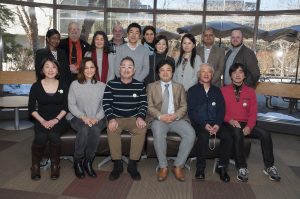- About Ramapo
- Academics
- Admissions & Aid
- Student Life
- Athletics
- Alumni
- Arts & Community
- Quick Links
- Apply
- Visit
- Give
Scholars from Japan Recall Events of 2011 Fukushima Nuclear Disaster During Symposium at Ramapo College
(PDF) (DOC) (JPG)February 23, 2017

MAHWAH, N.J. – The Roukema Center for International Education at Ramapo College of New Jersey recently hosted guests from Japan who participated in a symposium titled “Fukushima and the Human Consequences of Nuclear Disaster.” The all-day event was held to commemorate the sixth anniversary of the Fukushima Daiichi nuclear disaster of March 2011.
The nuclear accident was triggered by a tsunami which occurred after a powerful 9.0 earthquake shattered the region. The power plant not only suffered damage from the earthquake but proved particularly vulnerable to the tsunami, which resulted in a greater than 19,000 death toll and millions of buildings and homes destroyed or severely damaged, including the Fukushima Daiichi Nuclear Power Plant. More than 100,000 people were evacuated from their homes to escape the potential dangers of radioactivity exposure.
“Efforts to recovery in the region remain slow,” said Professor Fuminori Tamba of Fukushima University, whose comments were translated by Izumi Osawa-Minevich, of the Roukema Center, who was one of the presenters and a Fukushima native. “People outside of that area can often minimize what really happened and be positive. But people are still feeling the effects. This is why it is important to share stories with students and others. We are grateful that we had this opportunity to come to Ramapo College for this event.”
Tamba was one of seven visitors from Japan who presented during the symposium. Among the highlights was a recently produced documentary film, done in animation form that depicted the rescue efforts and the aftereffects of the nuclear event.
“Having faculty from around the world here to campus to discuss the triple catastrophe and the aftermath of that day in 2011 helps us better understand our role in responding to such tragedies and preventing future events that impact so many people on the planet,” said Aaron Lorenz, Dean of the School of Social Science and Human Services at Ramapo College. “This event is a reminder to our students of the value of collaboration and community.”
To date, there have been no deaths directly related to the nuclear disaster. And the Japanese government is urging evacuees to return to their homes despite news reports from environmental groups that say radiation levels remain dangerously high in some areas.
“It was a great privilege and pleasure to welcome Japanese experts and residents of Fukushima to share both their personal stories and professional experiences with this disaster,” said Ben Levy, Director of International Education at Ramapo College. “The College has been committed to supporting the residents of Fukushima through direct action immediately after the incident and through annual solidarity and awareness-building events, such as this symposium. We are confident the more than 150 students, faculty and staff in attendance gained a comprehensive understanding of the current realities on the ground in Fukushima.”
Professor Michael Edelstein, of the School of Social Science and Human Services at Ramapo College, helped coordinate the event, chair sessions and was a presenter.
###
About Ramapo College
Ramapo College of New Jersey is the state’s premier public liberal arts college and is committed to academic excellence through interdisciplinary and experiential learning, and international and intercultural understanding. The comprehensive college is situated among the beautiful Ramapo Mountains, is within commuting distance to New York City, was named one of the 50 Most Beautiful College Campuses in America by CondeNast Traveler, and boasts the best on-campus housing in New Jersey per Niche.com. Established in 1969, Ramapo College offers bachelor’s degrees in the arts, business, data science, humanities, social sciences and the sciences, as well as in professional studies, which include business, education, nursing and social work. In addition, the College offers courses leading to teacher certification at the elementary and secondary levels, and offers graduate programs leading to master’s degrees in Accounting, Applied Mathematics, Business Administration, Contemporary Instructional Design, Computer Science, Creative Music Technology, Data Science, Educational Leadership, Nursing, Social Work and Special Education, as well as a Doctor of Nursing Practice.
Press Release Archives
| 2025 | 2024 | 2023 | 2022 | 2021 | 2020 | 2019 | 2018 | 2017 | 2016 | 2015 | 2014 | 2013 | 2012 | 2011 | 2010 | 2009 | 2008 | 2007 | 2006 | 2005 | 2004 | 2003 | 2002 | 2001 | 2000 | 1999 |Copyright ©2025 Ramapo College Of New Jersey. Statements And Policies. Contact Webmaster.

Follow Ramapo